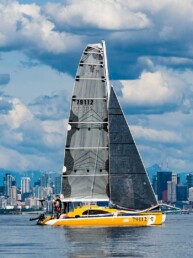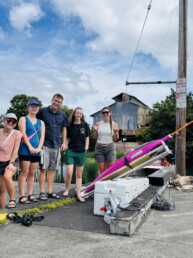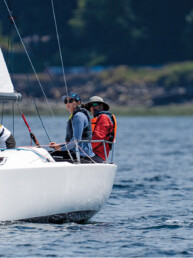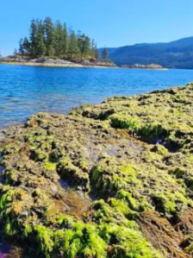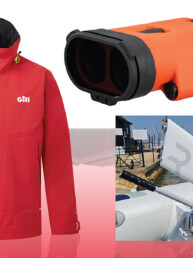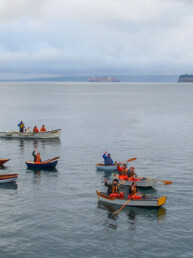48° North friend and contributor, Jennifer Harkness, not only gives us an excellent rundown of US Sailing’s DEI Women’s Panel… she moderated it! Please take her words to heart (and action).
EDITOR’S NOTE: The full video of this panel discussion is available below.
If you haven’t poked around the US Sailing’s Diversity, Equity, and Inclusion resource pages you will want to do that soon. They are working hard at getting these overdue conversations going in the sailing community. Their third panel was moderated by yours truly and had amazingly accomplished sailors speaking: Sally Barkow, Debbie Huntsman, Marie Rogers, Charlotte Kaufman, and our PNW heroine Jeanne Goussev.
The talk started with Debbie speaking about the history of women in sailing. It is hard to believe at times that we have only been discussing women in sports since 1972 with Title IX. In 1990, the National Women’s Sailing Association, of which Debbie is currently president, was born. This was a year after Maiden was the first all-female crew to sail the Whitbread Around the World Race, bringing much needed attention to women in the sport. They were also called a “tin of tarts,” by the media.
While we have come a long way in 30 years, we still have far to go until we have gender equality in the sport. The greatest hope of the panelists is that we make it easier for the girls and women coming up in the Gen Z (born 1996-2010) and Omega (2011-present) generations to pick up where we left off, and then send it. They are large in numbers and very social justice minded in the U.S. — so these panels are trying to get us older folks on board to support them the best we can.
The panel discussed specific barriers women have getting into the sport — a lack of representation, support, role models, and funding were central themes, along with plentiful bias. As host, I shared some data from the World Sailing Trust Women’s Strategic Report. In their study, 85% of women faced discrimination in sailing. Mirroring our panelists experiences and observations, they found four main areas were a barrier to women enjoying sailing and the reason they drop out: isolation, slights, harassment, and being treated as incompetent. I shared that one of the reasons I started sailing was because, as a mental health therapist, I wanted to get a break from trauma; but as I started sailing with women, I heard story after story of harassment, and even assault, on the water. This reflects the larger themes of sexism in the U.S. and abroad, with 70% of women globally reporting assault at some point in their lives, and 1 out of 6 women in the U.S. reporting rape.
An intention with this panel was to help men understand that sexism is their problem to solve through awareness and advocacy. The panelists all shared stories of discrimination. Sally Barkow, one of the world’s greatest sailors in my opinion, was recently treated as if she didn’t know what she was doing and had to get a man involved to be heard by another man. Even here in the PNW, a progressive spot on the globe, Jeanne shared what it was like with Team Sail Like a Girl before they won R2AK in 2018. It sounded much like the Whitbread in 1989. I remember being at yacht clubs and men saying disparaging and sexist things about their boat. Marie shared stories of the intersection of racism and sexism, and how being a competent woman in sailing is threatening to some men. Debbie shared a heartbreaking story of how she had to wear her full Coast Guard Auxiliary dress uniform and colors just to show she had the credentials to be in the room with male sailors, and she was sadly excluded even then. I couldn’t help but to think of all the women out there nodding and saying, “me too.”
If the stories of blatant sexism didn’t pull at your heart strings and make you want to do something, then we turned to numbers and money to appeal to business. Jeanne gave data stating that while women still have a 15 cent pay gap in the U.S., our numbers in the workforce are increasing. 85% of the money-making decisions in households are controlled by women, making us hold 60% of the wealth. Estimates are that by 2028 we will surpass men in earnings. Boat Trader put out an exciting report that boat sales to women this year have increased 75%. If you aren’t starting to look at women seriously in this industry, you are going to lose out.
Everyone had great ideas for solutions. Sally brought up the very important issue that women’s programs and organizations need funding. The Magenta Project has been instrumental in getting women out on the water in high performance boats, and is a perfect example of what we need to get women into higher levels of sailing. In fact, they mentored and supported Pam Lee and Cat Hunt, who recently sailed doublehanded around Ireland, setting a record that is touted to stand for years.
Jeanne brought up the sad numbers in her presentation of women in leadership roles, both on the water and in organizations. She emphasized the importance of hosting training and events in your communities to get women to the back of the boat.
Charlotte talked about the need for creating safe spaces in our online communities so women can feel free to participate more. She also pointed out that we need more diversity in leadership and on our boards. As I have said so many times, look around the room you are in and ask, “Who is not here? Who are we not hearing from in our community? How do we get them here?”
Marie brought up some great points on how to make your clubs welcoming so more than white men can and want to participate. Debbie appealed to men to step in and call sexism out when they see it. Sexism is ultimately an issue for men to acknowledge and resolve. This panel was a call to action with many suggestions on how men can do that.
It was hard to pack sexism in sailing into 90 minutes; this is a conversation that is going to need much more time. We have a lot of women sailors in the PNW. Something you can do right now is to listen to the women in your lives and have open conversations. For men reading this, ask women what their struggles have been and what you can directly do to help. As we look at 2021 and begin circling events in the SARC, ask how many events support women? How are we increasing representation in our communities through our programs?
This is the time for growth and change as we look forward. We can make sailing a more inclusive place and thrive together.
This article was updated at 9:30am on January 14, 2021 to correct that Debbie Huntsman was in the U.S. Coast Guard Auxiliary, not active duty U.S. Coast Guard.
Jenn Harkness
Jenn Harkness is a human being, artist, coach, therapist, writer, friend, mermaid, student of life and lover of all shine and sparkle. She is excited to be the new Editor-in-Chief of the Women Who Sail Newsletter, facilitating the mission of amplifying women’s voices and creating a kinder world through the content. She owns Poop Deck, a Ranger 29, and avidly races and cruises in the beautiful waters of Puget Sound. You can follow her adventures and hopefully gain unique and sometimes hilarious insights about feminism, mental health, and sailing over at skipperjenn.com

